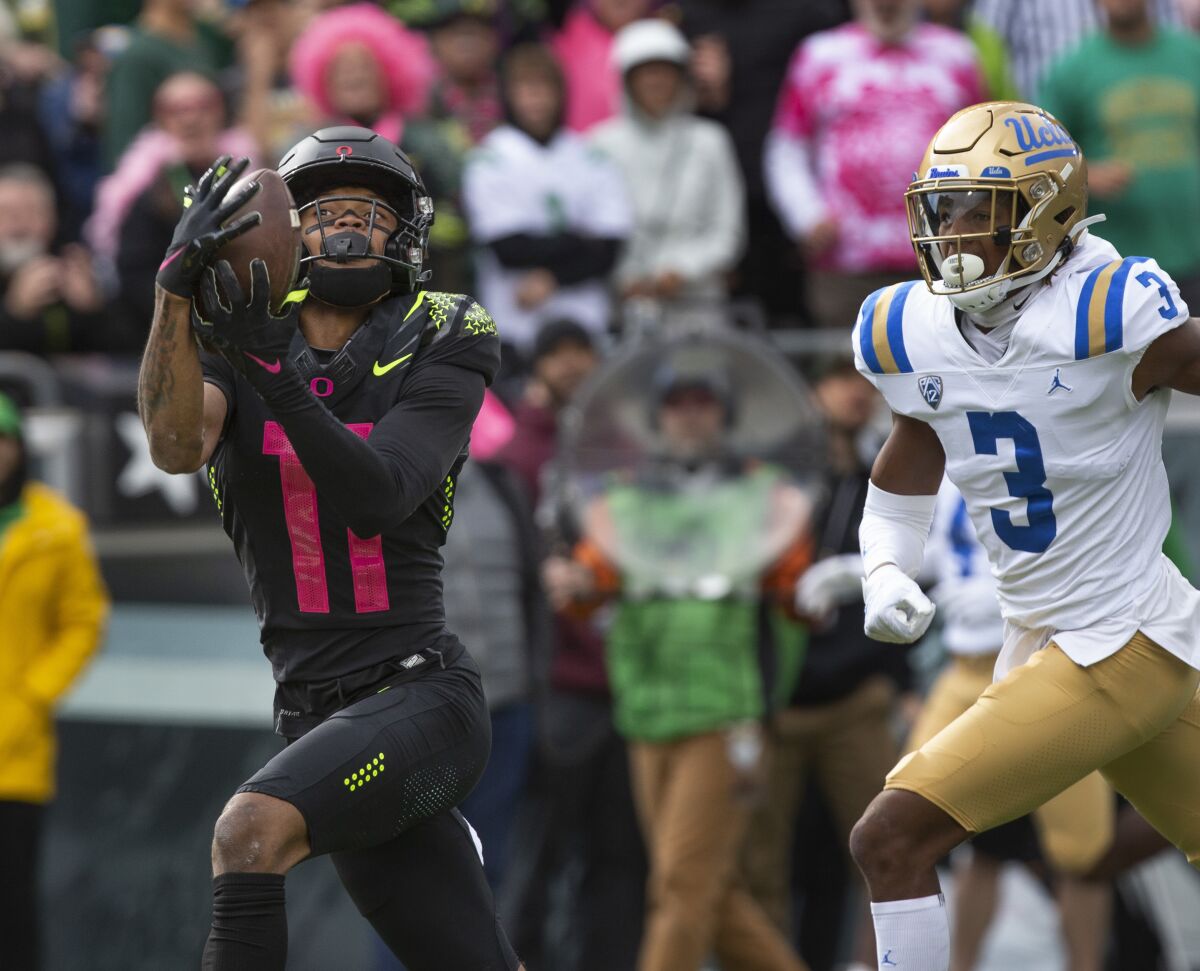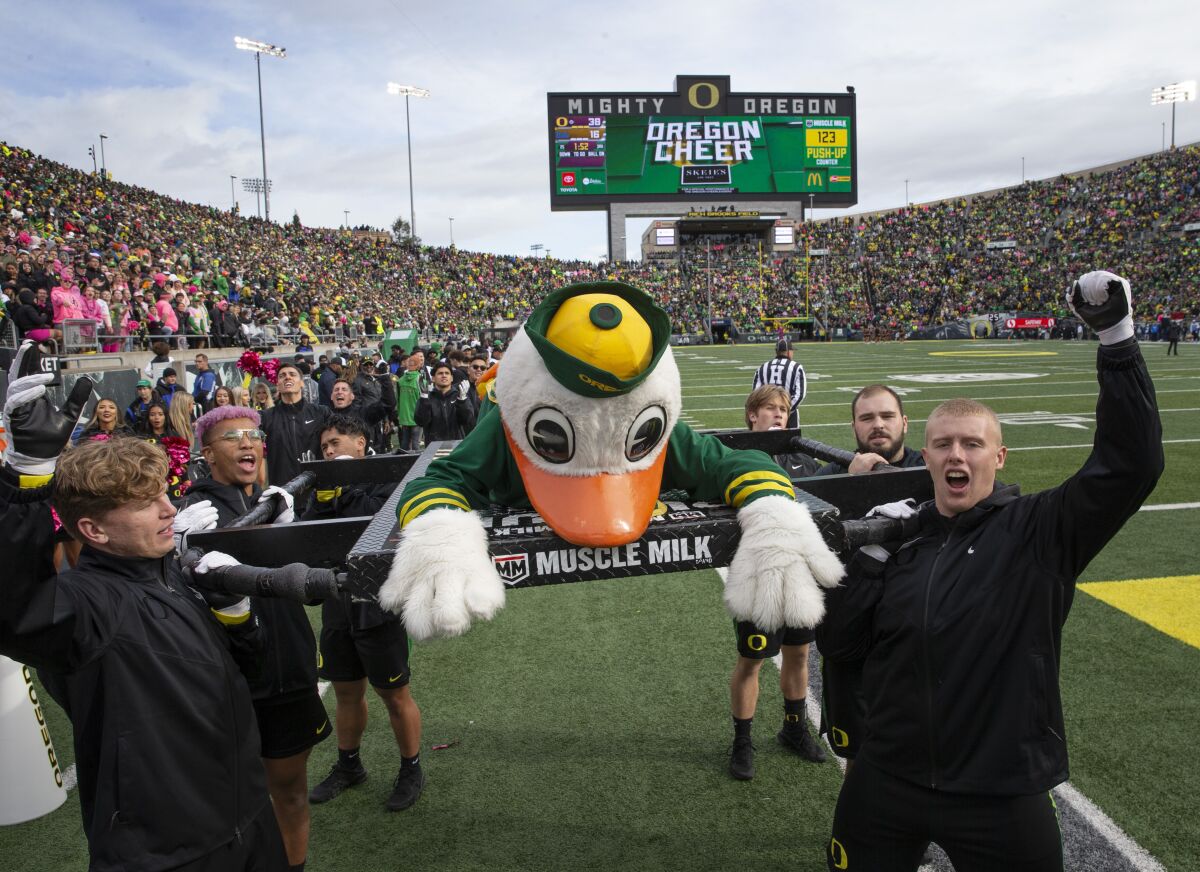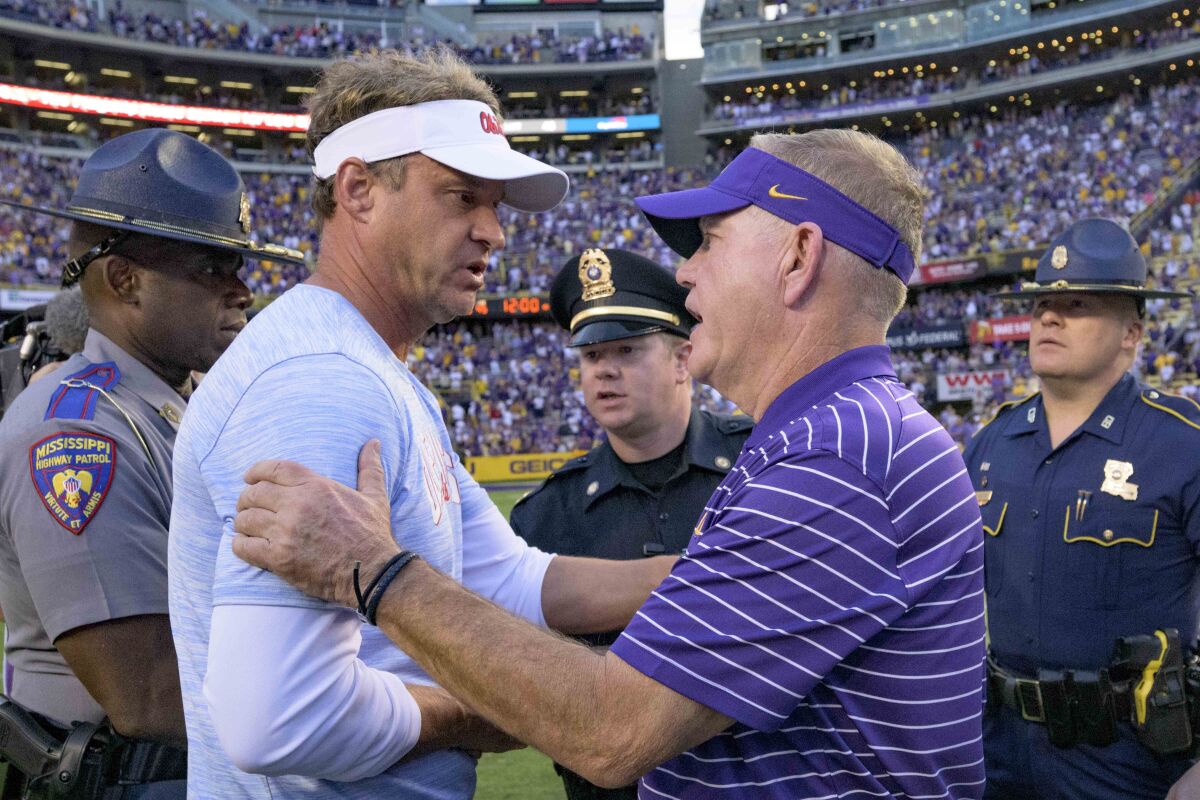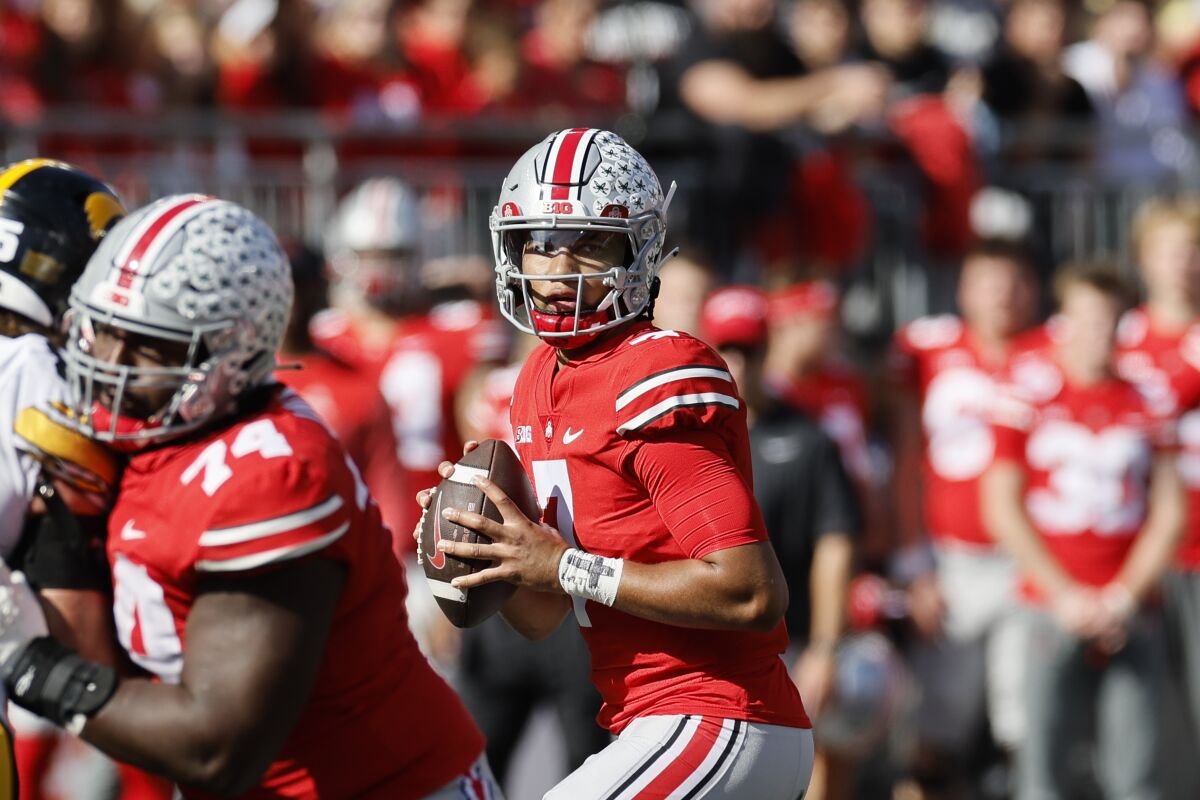At one point during Saturday’s second half, Texas led Oklahoma State by 14 points. By the end of the game in Stillwater, Okla. — a 41-34 win by the Cowboys that put to rest all the, “Hey, could the Longhorns make the playoff with two losses?” conversation — Texas led Oklahoma State by 14 penalties.
14-0.
Fourteen. To. Zero. As in, the Big 12 officials who called this game did not identify one Oklahoma State penalty during 60 minutes that wasn’t offset by a Texas flag.
Look, I’ve got no dog in this fight. I generally root against the establishment, and, while Oklahoma State has been a better program than Texas during the past last decade, somehow the Longhorns were favored by six points on the road Saturday against the Cowboys, which means my watching lens was not going to be tinted burnt orange.
But come on. Fourteen yellow flags to zero in a conference game officiated by conference referees? That’s going to draw a red flag.
Maybe I’m just a little sensitive after my trip to Salt Lake City last weekend. USC fans know it as the one where the Trojans led Utah by 14 points three different times in the first half but lost to the Utes 43-42 on a two-point conversion in the final minute.
Two Utah touchdown drives, one in the first quarter and one in the fourth, were kept alive by highly questionable roughing the passer penalties. USC head coach Lincoln Riley said after the game that the officiating was poor but made sure to say it wasn’t why the Trojans lost the game — it was the proper thing to say for a variety of reasons.
Still, if the Pac-12 officials don’t throw one of those flags, the Utes’ win probability drops dramatically.
I did not rip the officiating in my column from Utah because I did not allow myself to be fully convinced that a Pac-12 crew was taking every opportunity to punish USC for leaving for the Big Ten and propping up one of the best remaining Pac-12 programs that was playing a must-win game at home. No, I could not make that premise the focus of my column because it simply had to be wrong. Pac-12 refs are just bad, right? Their ineptitude does not discriminate.
But then I saw Texas 14, Oklahoma State 0. And I had to wonder: Are Pac-12 and Big 12 officials making it extra hard on their departed?
Texas, future Southeastern Conference member, is in its second season of its Big 12 farewell tour. USC, future Big Ten member, is in its first season of two saying goodbye to the Pac-12.
The Longhorns and Trojans now share much more than their status of being underachieving blue-bloods who have been duped into hiring Steve Sarkisian as head coach — they are potentially both receiving middle fingers from their respective conferences via college football officials, who already carry a well-earned vote of no confidence from long before any potential realignment bitterness.
Their bumbling reputation is kind of the perfect cover.
As infuriating as this must be for USC and Texas in back-to-back weeks, we as college football fans shouldn’t be that surprised if bias exists, particularly under these circumstances.
I actually can’t fathom directives against USC, UCLA, Texas and Oklahoma coming from the conference offices. What I’m suggesting is far more subtle.
Referees are people first, and most people who love the game enough to become college football refs were fans, too, before they decided to don the loathsome black and white stripes. They can try to eliminate their past leanings all they want, but that’s hard to do — especially when certain privileged schools’ decisions are negatively affecting all those left behind.
College football is petty and driven by regionalism. If you think that USC, UCLA, Texas and Oklahoma are going to consistently compete on an even playing field before they join their new conference destinations, then you need a history lesson about the sport.
On the other end, it will be up to the Big Ten and SEC to protect their new members from a lengthy hazing process enacted by grown men wearing zebra suits.
No Big Ten, no problem?

Oregon’s Troy Franklin, left, pulls down a touchdown reception ahead of UCLA’s Devin Kirkwood Saturday in Eugene, Ore.
(Chris Pietsch / Associated Press)
Oregon would love to be headed to the Big Ten with USC and UCLA. Oklahoma State would love to be headed to the SEC with Texas and Oklahoma.
Remove ego and easy money from the equation, though, and they may see the situation differently.
The best thing that could have happened to the Ducks and Cowboys — by far the best programs left in their conferences — was the university presidents who run the College Football Playoff putting their foot down and saying the playoff would expand to 12 teams with the six top conference champions as automatic qualifiers.
That means we can assume that the Pac-12 and Big 12 champions will make the playoff going forward.
Oregon, then, in particular is set up to make the playoff most years. The Ducks have been the most consistent winner in the Pac-12 since Pete Carroll left USC, and it’s not even close. First-year head coach Dan Lanning showed Saturday in Oregon’s 45-30 win over UCLA that he’s found his footing quickly, and we know Phil Knight will cover most of any financial deficiencies between the Pac-12 and the Big Ten.
Because of that advantage, the Ducks will play a different game in recruiting and name, image and likeness than any other Pac-12 school. Utah will always be a tough opponent as long as Kyle Whittingham is there, but Oregon can sell recruits — accurately — that if they come to Eugene, they’ll have a chance to play for the national championship every year under the new 12-team format.
USC and UCLA may be rich in media rights revenue, but they will have to be top-five caliber teams to earn the Big Ten’s automatic bid to the playoff.
Under the planned 12-team format, there’s a very real scenario in which USC has eclipsed Oregon as a West Coast power once again under Lincoln Riley but has to fight to equal the Ducks in playoff appearances. Of course, in that case, we’ll know the reason.
Oklahoma State, which will jump into the top 10 Sunday after beating Texas, could reap those same benefits in the Big 12. But the Cowboys will not have the vast talent differential over its league brethren that Oregon would enjoy in the new Pac-12.
Pac-12 reset

The Oregon mascot collapses after doing 38 pushups to match the score in the third quarter of the Ducks’ win over UCLA Saturday in Eugene, Ore.
(Chris Pietsch / Associated Press)
Oregon looks like the class of the Pac-12. Utah had the Ducks’ number last year, but this Oregon team appears to be quite the puzzle to defend thanks to the evolution of Auburn transfer quarterback Bo Nix under Oregon offensive coordinator Kenny Dillingham.
For simplicity’s sake, let’s assume the Ducks will beat the Utes in Eugene, giving Utah a second Pac-12 loss. In that case, the winner of USC-UCLA on Nov. 19 would earn a spot in the Pac-12 title game against Oregon — if the winning crosstown rival handled its business elsewhere.
USC and UCLA may have received their predictable humbling the last two weekends on the road, but both teams will likely still control their own destiny for the league crown.
Brian Kelly validated

LSU coach Brian Kelly, right, shakes hands with Mississippi coach Lane Kiffin after the Tigers defeated the Rebels in Baton Rouge, La., Saturday.
(Matthew Hinton / Associated Press)
Louisiana State ran away from No. 7 Mississippi 45-20 Saturday, bringing its record to 6-2 and an impressive 4-1 in the SEC.
If LSU had not blown the end of its opener against Florida State, it would likely be in the top 10 this week. But Brian Kelly’s Tigers — led by Arizona State transfer quarterback Jayden Daniels — still control their own destiny in the SEC.
LSU has a bye next week before hosting Alabama Nov. 5. No. 1 Georgia against No. 3 Tennessee will rightfully draw the majority of the attention that day, but Kelly trying to take down Nick Saban in Death Valley should be amazing theater.
Riley has gotten plenty of praise for executing a quick turnaround at USC, but Kelly deserves credit for his work on the bayou, too.
Future Big Ten power rankings

Ohio State quarterback C.J. Stroud plays against Iowa Saturday in Columbus, Ohio.
(Jay LaPrete / Associated Press)
- Ohio State
- Michigan
- USC
- Penn State
- UCLA
- Illinois
- Maryland
- Wisconsin
- Purdue
- Minnesota
- Michigan State
- Nebraska
- Rutgers
- Indiana
- Iowa
- Northwestern
Stay connected with us on social media platform for instant update click here to join our Twitter, & Facebook
We are now on Telegram. Click here to join our channel (@TechiUpdate) and stay updated with the latest Technology headlines.
For all the latest Fashion News Click Here
